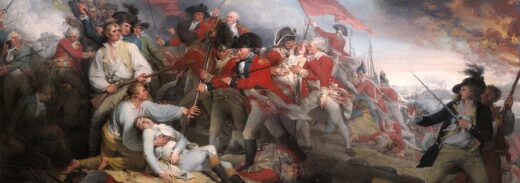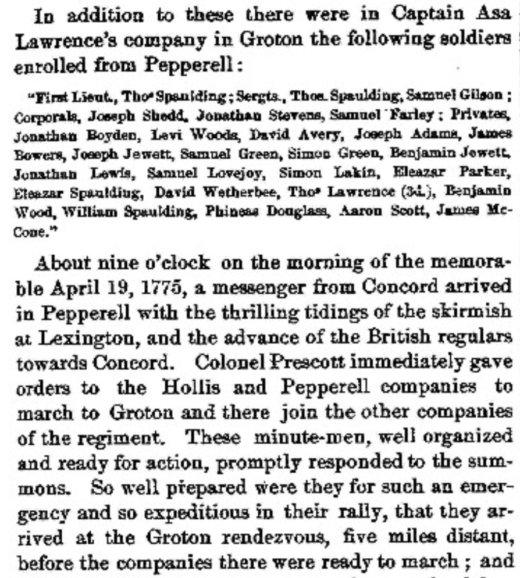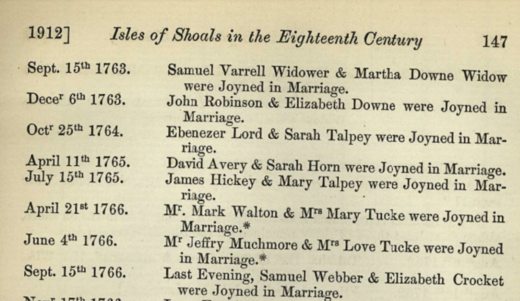
On this site a few days ago, in a conversation about the misdeeds of our ancestors, Jean Henry mentioned that a relative of hers, Colonel Ephraim Doolittle of Shoreham, Vermont, was likely responsible for the deaths of many men in his command at the Battle of Bunker Hill in June of 1775. Doolittle and his lieutenant colonel, she said, “made some excuse to not be there, and sent a major in their stead who was killed, as were most of his men.” In a followup comment, she then added that his regiment, known as the Doolittle Regiment (Massachusetts 18th and Continental 24th), had 9 companies, mostly comprised of men from central Massachusetts. Well, this got me wondering whether my ancestor, David Avery, who also fought the British in the Battle of Bunker Hill, could have been under the command of Doolittle. While I knew that he’d survived the war, I was wondering if perhaps he’d been wounded, and, if so, if I could hold that over Jean’s head… assuming he was in Doolittle’s regiment.
I’d known that my great^6 grandfather, David Avery, born on August 4, 1737, in Townsend, Massachusetts, had fought at the Battle of Bunker Hill, but I hadn’t known the specifics, so I decided to do a little digging, to see what I could find out. And it looks as though he fought under Colonel William Prescott and a Major Woods in the battle, as part of Captain Asa Lawrence’s company in Groton. [Groton is just about five miles north of Pepperell, which is pretty close to the New Hampshire border.] The following excerpt is from the 1890 book, History of Middlesex County, Massachusetts: With Biographical Sketches of Many of its Pioneers and Prominent Men. My ancestor, for what it’s worth, does not appear to have been a prominent man. He doesn’t garner as much coverage in history books, for instance, as the other David Avery, the Revolutionary War evangelical chaplain who is said to have stood in battle with his arms raised in prayer, but, when duty called, he was among the minute-men who traveled the 38 miles from Pepperell to Boston to fight. He was a Private.

I’ve yet to see the actual entry, but I’ve read that David Avery ia named in the 1776 records of the Pepperell Church of Christ, on a list of men following this text by Pepperell Reverend Charles Babbidge: “A list of ye names of Soldiers from Pepperell who were engaged in ye Battle of Bunker Hill, having been recently made out by ye Survivers of the little band, it was thought that posterity would gladly receive any information respecting these of their fathers, who willingly & promply forsook house, friends & property to obey ye Call of their Country. It will ever be ye glory of Pepperell that its number’s so intimately associated with that of Prescott. Coming generations will do honor to these of her sons, who were so active in ye opening scenes of ye Revolution.” Apparently there is also a second list in this book, which lists those killed in and wounded in the Battle of Bunker Hill, and David Avery is not among those on that list, which would seem to indicate that he escaped unscathed, at least physically.
I should add that, while I have some questions about my ancestors prior to David Avery, I’m pretty confident that he’s my great, great, great, great, great, great grandfather, as I know that he married Sarah Horn on the Isles of Shoals off the coast of New Hampshire on April 11, 1765, and three years later, on June 30, 1768, they’d have a son, Daniel Avery, in Pepperell, Massachusetts. It’s then Daniel who would move the family to Schuyler, Illinois, where this particular branch of my family has been ever since. [My great grandfather, Arthur Lee “Pickle” Avery, who I was fortunate enough to have known, was born on February 27, 1901, in Schuyler, Illinois. He would pass away on October 22, 1977, just outside of Schuyler, at his home in Beardstown, Illinois, at the age of 76.]

So, to answer the original question of this post. No, it would appear that my ancestor, David Avery, did not fight for Jean’s ancestor in the Continental 24th, but with William “Do not fire until you see the whites of their eyes” Prescott in the Continental 7th. I should add that it’s quite likely that my ancestor, David Avery, knew Prescott quite well, given that the Colonel owned a home in Pepperell, on Prescott Street. [I’d love to have heard their conversations in the weeks leading up to the battle, likely over beers at a local tavern.]
I should also note that the Battle of Bunker Hill did not take place on Bunker Hill, but on a close-by hill that would later be know as Breed’s Hill. And more than 100 American patriots are thought to have died over the course of the battle, with another 300 or so having been wounded. While the British technically won the battle, they lost over 200 men, and the battle did a great deal to boost the morale of the rag tag American revolutionaries, who saw that they could hold their own against the much better outfitted British military. Three weeks later, on July 2, 1775, George Washington would arrive in Cambridge, Massachusetts, and take command of the Continental Army. And you, of course, know how the story ends.












21 Comments
Sorry, mom. The truth is out.
In his defense, he could have killed my ancestor. It just didn’t happen at the Battle of Bunker Hill.
1500 Colonialists fought at Breeds Hill in the Battle of Bunker Hill. My great… great grandfather was not among them; yours was. And yet mine was in a position to get men killed there while escaping any risk himself. What a shitty business. How few leaders show servant leadership which is the only kind with any worth.
Mark, there is some decent accounting of the movements of Prescott’s troops v the others, thanks to the lack of ammunition they had on the second round– Whites of their eyes and all that. Not much is know of Doolittle’s troops. A suppose I should be grateful.
Not relieved, Anonymous. Just to be clear.
New Years is my favorite holiday, in the sense that it’s an opportunity to reset and do better. Because of the makeup of my work group, I get to wish a happy new year four times each calendar year, so I have four chances to improve. Again, I don’t think it’s especially useful to dwell on the past beyond seeing what could have been done differently so that the future can be better. What’s important is that we try to be better people to each other and to ourselves. I know you, Jean, and you, Mark, have that desire and intent, because I know both of you beyond the text in this comment section. As for the rest of you, I also wish you a Happy New Year, and for all of you to be best!
The Redhats are the new Redcoats. They must be defeated just as surely, by any means necessary. Those great Revolutionary and Civil war fighters are counting on us not to let it all slip away in 2020.
F is for FFG and FISA apps
https://youtu.be/IXTIxPeaASM
Anonymous– Happy New Year Anglo-style. I enjoy history. Family history is just a more intimate take. My own is accessible and to some degree recorded– a function of great privilege on one side and a refusal to leave the county on the other. I try to correct my mother’s incessant myth-making by researching her accounts on occasion and relaying what I find to my kids and my nieces and nephews. My mother loves to say my grandfather was ‘practically raised by the Indians on Tiburon’ because his very fancy home life was so terrible’ there were no Indians on Tiburon ever or anywhere thereabouts during my grandfather’s lifetime. She has even written and self-published a book full of false accounts. So I feel some burden of correction. The danger is always that one may just make new myths.
The real gift in looking back is that places can come alive outside of the context of our times and our lives. History is a form of travel. Its study properly builds empathy for others and some healthy, intellectual detachment from the crisis du jour. (Trump excepted because Trump is exceptional) . It marks time like your sequence of New Years’.
I’m not a fan of New YEars having worked in too many bars and restaurants over the years, but I love the seasons for the same reason. And I have felt relieved for the last few days. I always feel better when the holidays end. I have pozole on the stove and the house smells great. Also mom left on the 30th… And many grants were due on the 31st.
Relief! Happy January to all!
FF– Finally a good link! It is a New Year!
“Tell it by the fireside or in a marketplace or in a movie, almost any story is almost certainly some kind of lie.”
I couldn’t agree more. Doesn’t that erode your constant accusations of “Liar!”–pulling the “Liar” alarm, if you will?
Not sure OW would follow your FISA apps correlation, but go ahead and chase that rabbit.
Complex question fallacy.
I don’t constantly call people “liar” I reserve that term for egregious misrepresentations wherein there is no other plausible explanation for the misrepresentation. I don’t use that term often either.
Orson Welles was sensitive to fraud, absence of lies, AND police abuse of power. The connections between Red Coats, Friendly Foreign Governments (FFG), fraud, and FISA abuse would have been obvious to him. Check it out. If you liked that link then you will think this link is a real Carter Page turner.
https://youtu.be/Crn_mPWd1HQ
FF— how is it you think you know what about the the connection between the redcoats, fraud, FFG and FISA abuse would have been obvious to Orson Welles? Did you apply logic?
Because there is a ton of evidence that he is smart and he is sensitive to things like fraud and police abuse of power. I provided evidence above of those sensitivities. Do I need to remind you that you are the one who initially made the claim that OW would not follow the FISA correlation if he were alive today? How did you arrive at that conclusion? Answer: You arrived at that conclusion through general ignorance and because you love for making shit up. Orson Welles is not the easily brainwashed type.
“Not sure OW would follow your FISA apps correlation, but go ahead and chase that rabbit.” — me
“you are the one who initially made the claim that OW would not follow the FISA correlation if he were alive today? ” FF’s version of me
“How did you arrive at that conclusion?” I didn’t.
“Not sure OW would follow your FISA apps correlation, but go ahead and chase that rabbit.”
So you were trying to say that the intended meaning is that OW probably would get the correlation but you are not 100% sure? I agree.
A conclusion does not require 100% certainty. A statement of likelihood is a conclusion too. No?
If your point is that I should have said Orson Welles PROBABLY would understand the connection then I agree.
Is there disagreement? If so let me know.
A statement that begins “Not sure” is not a conclusion FF. Jesus, you are dense.
Moronic Jean! Especially moronic given the conversation is about “F for Fake”. I highly doubt you understand the movie at all—though you seem to be indicating you like it.
Based upon the information you have or lack thereof you have **concluded** that you lack certainty about whether or not OW would see the correlation. I don’t know the degree of your uncertainty. Your statement is vague and can be interpreted in multiple ways but you **in fact** made a judgment of likelihood.
Wait a minute! Jean’s ancestors had an opportunity to nip this whole thing in the bud and blew it? Just one more reason to hate the Henrys.
Wasn’t the Henry side, iRobert. They were Tories.
So the Tories had a chance to keep this blog from ever existing? Man! Talk about missed opportunities. That’s a real doozy.
Recently my nephew started researching Ephraim Doolittle for a school project and asked the question everybody wants to know about their early American ancestors it appears— did he hold slaves? Also Matt Jones counseled me not to be so quick to judge Col. Doolittle for not heading to Breed’s hill with his regiment and I respect his take on military history and pretty much everything.
It turns out that Ephraim was pretty amazing. He not only didn’t own slaves but was an abolitionist who was a member of the Massachusetts assembly representing Worcester. He received that position from the Chandler family which had dominated Worcester colonial politics. Then he betrayed them. He protested the Stamp Act and he write and got alto all for instructions to representatives from that city to oppose slavery, move funding from elite Latin schools to education for the masses, demand open meetings, etc etc. At the time Massachusetts was the center of Northern slave trade. He was a surveyor and merchant (a hatter — no jokes) as well as a soldier. He spent time hanging out with a young John Adams who describes him in his autobiography as ‘a stickler for deism and equality’ and also an great talker.’
He trained his regiment well and there’s a letter at the national archives from him to John Hancock from a year before Breed’s Hill where he tells him his troops were trained and ready to go but waiting much longer for engagement might dissolve their commitment. Many troops who fought at Bunker Hill were signed up untrained and underarmed in the days before. Doolittle’s regiment only lost 4 men including the Major who replaced him. Maybe their training spared them more casualties or maybe they just drew a lucky hand.
Lastly he truly founded a town— Shoreham VT. He had admired the area while building a northern road between New Hampshire and Lake Champlain in the French and Indian War. He and some of the men with him solicited settlement land grants for the area which was then the most northern and westward settlement in the colonies. After the first summer spent clearing land and building a cabin and during which many became ill, most of the men abandoned their claims, believing the area uninhabitable. He bought their claims which is why I thought he had grabbed land. He continued to go up there throughout both wars, clearing land, building saw mills and grain mills and soliciting other settlers. The town was incorporated in 1781 and he moved his family there that year. He lived out his life there and my great great grandfather was born there, trained as a surveyor and map maker and took off for California.
Side note: Best part is the Ephraim was 4th generation American. His great grandfather Abraham Doolittle came over in 1640. And somewhere in there was an aunt named Thankful Doolittle who married a gentleman named Bacon —making her Thankful Doolittle Bacon. my next dog’s name, obviously.
So there you go, Mom. You were right. He was a soldier and a statesman and, most importantly, not a jerk it seems. the record stands corrected. But the rest of them were tyrants and scoundrels!
Hello!
I’ve found this through research as I am an ancestor of Ephraim Doolittle as well. I had read in the research provided to my family about Ephraim that he was shot and disabled in the battle of Bunker Hill, but it seems that was wrong. I would love to know how I can learn more about him. So happy to learn he was an abolitionist!
Hey Ashley—
The colonel who took his place leading his battalion was killed at Bunker Hill. He was one of just 4 lost to the group. The battalion’s role was effectively back up. It was probably just bad luck that caused the Colonel’s death v inevitability. Ephraim didn’t fight but to be fair he was quite old and had fought in plenty of battles 20 years prior in the French & Indian War. I’ve only done Online research but have some idea of his life. I’m intending to go East with my son this summer to do more primary research. When I write it up I’ll place a link here. Keep checking back.
The basic life story is that Ephraim was third generation American. His father and grandfather were clergy in Worcester MA, which was a very progressive city then. He fought in the French & Indian Wars in what was then the western most region of the colonies, NW Vermont. He helped re-capture Fort Ticonderoga. While in Vermont, he and fellow soldiers staked a claim on land in what is now Shoreham VT. The records in that town are quite complete and interesting as to what it took to make a settlement in that time. The homestead is still there. That town founding took 30 years. Doolittle was from Worcester MA and at one point was a representative to the colonial government in MA (yes they did have representation, kind of…) and was involved in some shenanigans there essentially getting appointed by landed gentry to the representative position for Worcester as their proxy and then taking the reigns and redirecting the ship to a more Democratic governance structure and introducing abolitionist measures which failed. Searching the Worcester historical records online brings some mentions. He is mentioned in the Adams papers as having a good mind of philosophical religious bent and a large library. It seems he and Adams were drinking buddies who hung out whenever Adams was in Worcester despite Adams being of a very different class. Ephraim likely had a religious education, not university like Adams. At one point he owned a hat store. They were merchant/clergy class. He was trained in surveying skills like all the cool colonial kids. His grandson (my great-great grandfather Alonzo Doolittle) was also a surveyor, headed out west in the 1840’s and made some of the first geological maps of California and Nevada during the Gold Rush. I’m from the California Doolittle branch. I know my mom met some of the Vermont contingent. I went to Shoreham as a kid and just remember apple orchards.
Ephraim’s an interesting man with pretty incredible life experiences but not a particularly famous one. Way more interesting than I expected. And more noble. I’ll probably find out terrible things researching this summer. That’s usually how genealogical research works. We’ll see.